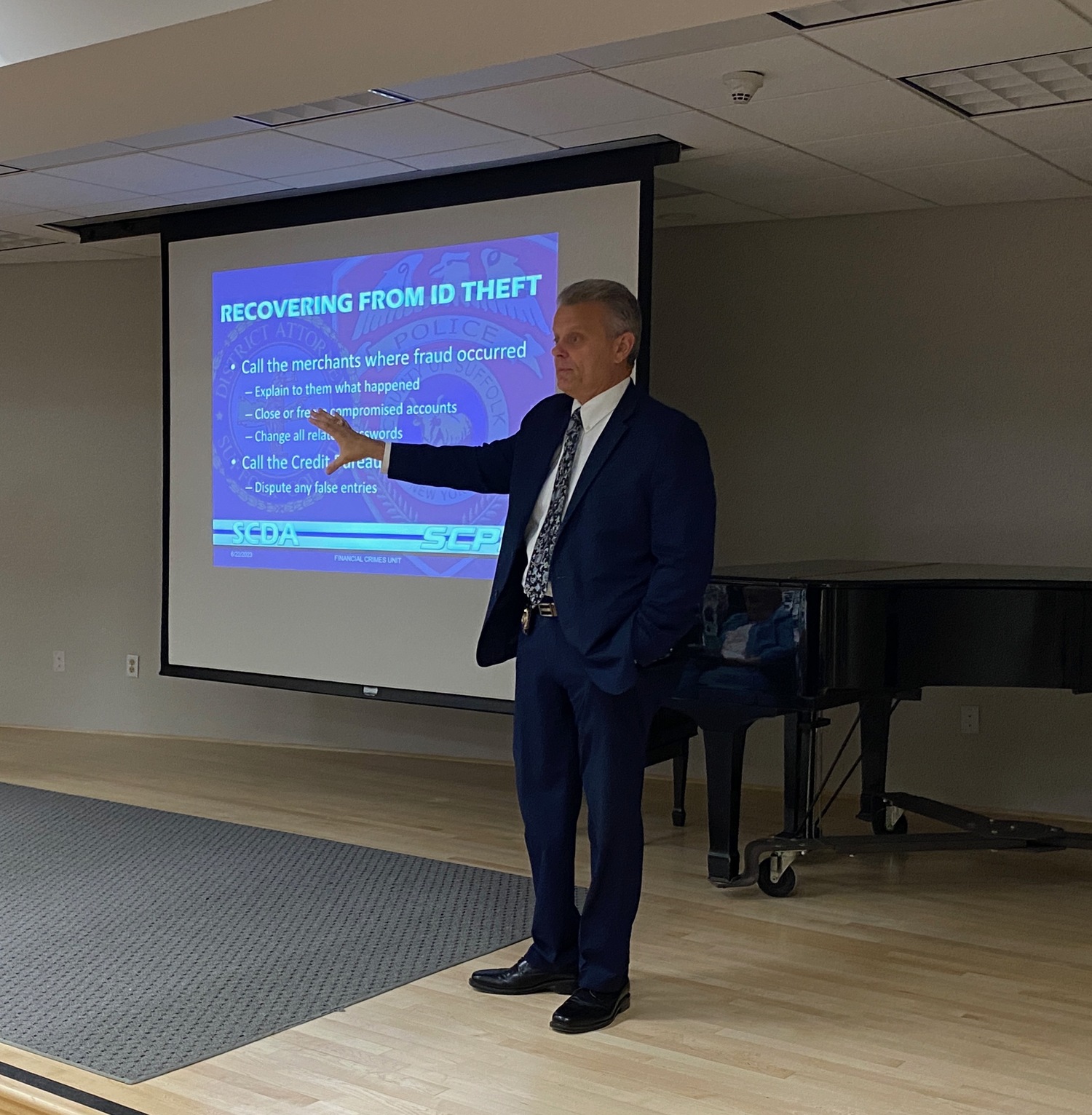
Scams may come in many forms: Identity theft, robo phone calls with a sales pitch, or the hacking of emails or social media are just a few.
In an effort to educate the public about possible scams, State Senator Anthony Palumbo teamed up with the Suffolk County district attorney’s office and the Suffolk County Police Department to host a senior scam prevention seminar on Thursday, June 22, at the Riverhead Free Library.
“Prepare to be a victim,” Suffolk County Police Detective Tom Gabriele warned those in attendance. “Your information is out there somewhere right now. It is just a matter of time before someone does something with it or tries to do something with it.”
Gabriele noted that once that information is online, it cannot be removed. Con artists will research a potential victim’s personal information and use social media to learn about them.
They can be persuasive and play on their victim’s emotions, or even threaten them, officials said at the forum. They want their victims to make irrational decisions in a hurry, and scammers will manipulate their victims without remorse to get what they want.
With that in mind, people should adopt more skepticism and caution when someone asks them to wire or mail them money, or purchase reloadable cash or gift cards, the officials said.
Chris Stazio from the D.A.’s office suggested that people always take five seconds to pause and think. If someone is about to wire someone else money, they should ask themselves why and call someone to double check to see if they are being scammed. The minute someone can talk to somebody they know, the entire scam collapses.
“It is very, very dangerous to stay on the phone with these guys,” said Stazio. “They are eliciting information from you without you even knowing.”
Palumbo shared a story of how he personally fell victim to an identity theft crime.
A scammer hacked his entire contact list, from decades of former law clients to distant relatives, and sent out a mass email requesting $1,162 from each recipient. The scammer forged Palumbo’s signature on the email and requested that the money be sent through Zelle, a digital payment app. The email promised that Palumbo would then send a check with the same amount of money back to that person.
Unfortunately, some of the members of his contact list fell victim to the scam and lost the money.
The audience reaction to Palumbo’s story was a variety of “oh, wows,” “oh boys” and gasps.
“You don’t have to walk into a store with a gun and a mask. You can just sit in your living room and become sophisticated in certain types of transactions and computer hacking, and make a lot more money,” Palumbo said.
Modern scams extend beyond phone calls and emails. Stazio and Gabriele warned the audience that credit card and debit card “skimmers” might be placed on local ATMs or gas station pumps.
“One thing you need to know about bad guys is that they are lazy,” Gabriele said.
The skimmer rests on top of the actual card reader, but since the criminals are lazy, Gabriele said, they will most likely place the skimmer on the device with double-sided tape. If the card reader on an ATM or gas pump moves, do not place your card in it, they warned. Instead, inform a worker at the gas station or business where the ATM is located that their card reader is loose and that there might be a skimmer attached.
Since it is a common scam that occurs at gas stations by outside criminals, it might be wise to use a credit card instead of a debit card, they said, since the debit card is directly connected to a bank account.
This new wave of criminal activity, which manipulates the benefits of technology to scam their victims, has spread across the country, the officials said. Criminals might be lazy, but they are smart in their strategies to steal money with their victims being unaware of that fact until it is too late.
Further information is available from the County Police Financial Crimes Unit at 631-852-6821 or the District Attorney’s Financial Crimes Bureau at 631-853-5602.